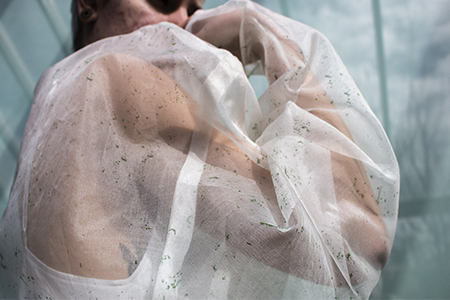

Biogarmentry
The world has held the fashion industry responsible for microfiber pollution, carbon emissions from textile factories and other harmful impacts caused to the environment. A Canadian-Iranian designer has collaborated with scientists from the University of British Columbia to innovate a textile capable of absorbing carbon emissions.
The garment contains algae that have been fabricated into a textile that the team has termed Biogarmentry. This fabric can also photosynthesize as the prototype resembles cloaks.
With respect to the United Nations Environment Programme (UNEP), the fashion industry is responsible for over 10% of all the greenhouse gas emissions. The US Environment Protection Agency reported that American consumers buy most of their garments and footwear each year and dispose of over 70% of their closet each year.
Aghighi hopes that this change will help a new perspective on how people relate to their clothing. The biofabric comprises Chlamydomonas reinhardtii algae, which comes to life in the presence of water and sunlight for photosynthesis.
The designer Charlotte McCurdy explained that traditional textile materials such as hemp and cotton absorb carbon as the crops grow however they still emit carbon during the manufacturing process.
McCurdy has also explored the idea of algae-based fashion and has designed a raincoat made out of marine algae and other biodegradable compounds. She also stated that the Microalgae can be made into a powder to make fiber.
McCurdy explained that the algae would not be used to produce new plastic material but I meant to isolate carbon. The carbon-negative drive in the fashion space may soon be based on fabric derived from algae. However, outside the fashion industry biotechnology has been used to replace polyurethane plastics, fabrics, and make biofuel.
Kathmandu has launched Seeker range, an innovative and sustainable activewear collection that merges eco-friendly advancements with functional design.
The Global Organic Textile Standard (GOTS), managed by the non-profit organization Global Standard, has joined the Make the Label Count…
Packaging company Pact Group has partnered with textile recycling technology firm BlockTexx to develop a system for recycling discarded clothing…
Loftex USA is strengthening sustainability with the launch of eco-friendly towel sets, blending innovative performance features with luxurious designs.
Toray Industries, Inc. announced that starting this April, it will implement the mass balance approach in manufacturing its TORAYLON™ acrylic…
Cxffeeblack has joined forces with COMOCO Cotton, a sustainable textile company, to create a special coffee-dyed T-shirt made from unbleached…